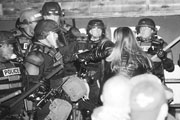RAISING BLAZE
Bringing Up an Extraordinary Son in an Ordinary World by Debra Ginsberg (Harper Collins, $23.95)
The idea of a parent’s worst nightmare has taken on fresh implications this long, weird summer which began with the disappearance of coltish Elizabeth Smart from her own bed and is winding down with not one, but two, stories of twins conjoined at the head. It’s hard to compare degrees of misery when it comes to children, but Debra Ginsberg’s story, chronicled in Raising Blaze: Bringing Up an Extraordinary Son in an Ordinary World, is not one any parent would choose.
On her son Blaze’s first day at kindergarten in the fall of 1992 in San Diego, Ginsberg walked in with a happy, healthy little boy who knew his letters and his numbers and showed a keen appreciation for jazz, but she left with a troubled kid in special ed. Thus began her ongoing struggle to help her child adapt to the world (he’s now 15)—or, more aptly, her struggle to help her child cope with public school. Readers unfamiliar with the diagnosis-mad, pill-pushing, test-obsessed places many public schools have become may be shocked and horrified at what seems like publicly funded torture of this boy, whose crimes include saying things like the floor hurts his feet, wanting sounds to be assigned numbers, having difficulty cutting with children’s scissors, and describing the days of the week with colors (tell me Monday isn’t “gray”).
Ginsberg is obviously too close to the story to see the big picture, and the book makes little attempt to connect Blaze’s experience with the general explosion of special education, especially for boys (see “What Little Boys Are Made Of “). Readers may find themselves nearly enraged at her acceptance that it is her son—not the school—that is the problem. But the single mother—who previously wrote a book about her work as a waitress, Waiting—throws herself into coping with Blaze with remarkable devotion, going so far as to become a special-education aide. She takes him to a parade of doctors who diagnose everything from autism to retardation to nothing (her father thinks the trouble is that Ginsberg’s labor was induced). After relentless pressure from nearly everyone who comes into contact with Blaze, she even gives him Ritalin briefly, but nothing really helps. Well, the one thing that helps is a great teacher, which Blaze finally gets in the sixth grade, but that is a sadly short-lived experience.
Why she keeps him in school is at times hard to comprehend, and the book tends toward a flat tone that’s at odds with the wrenching, painful saga of Blaze’s agony at school. It’s likely that’s Ginsberg’s own coping mechanism. At a reading at Zeitgeist earlier this month, she said that she’s hoping to get Blaze into a private school this fall and that her book may help pressure the public school system into paying for it.
Despite this bit of good news, it’s hard not to feel anxious about Blaze’s future. In a system where being called “different” is not a good thing, children like Blaze will find few comforts; and the sad but unmistakable message of this book is that their parents may find a public education inadequate, if not terribly damaging.









